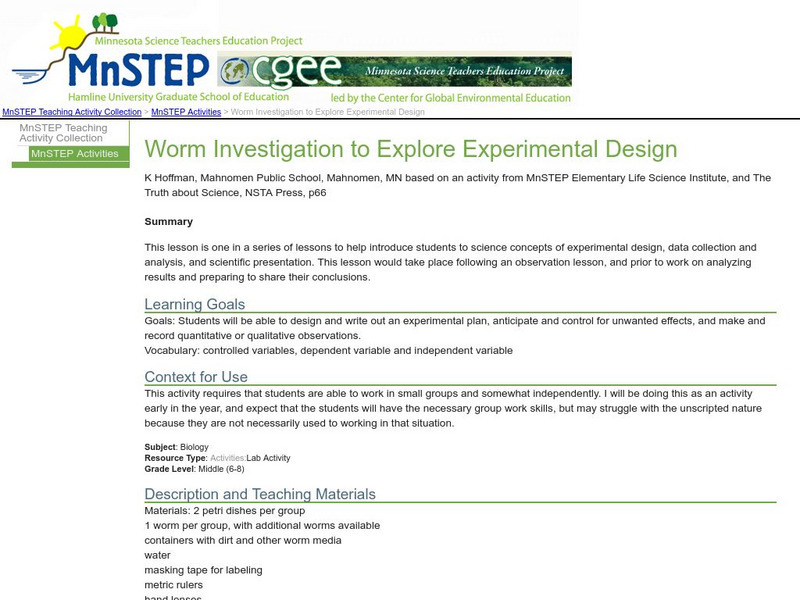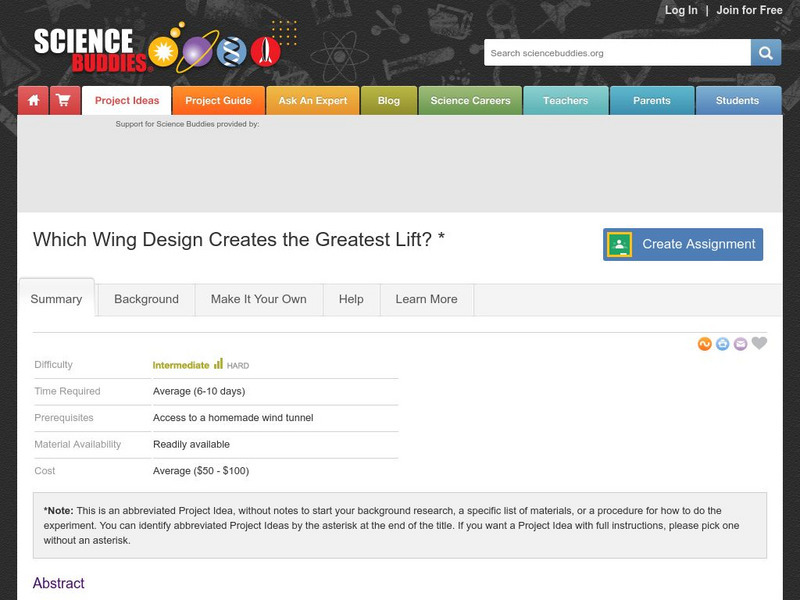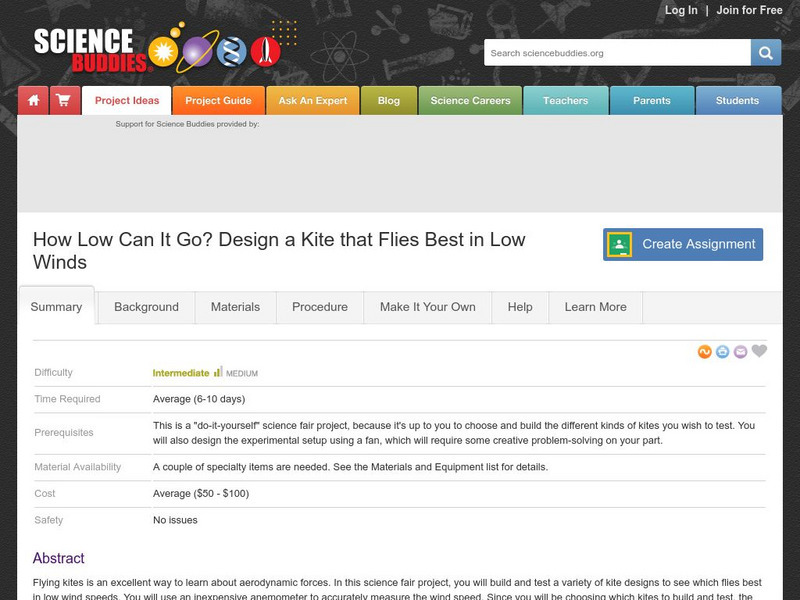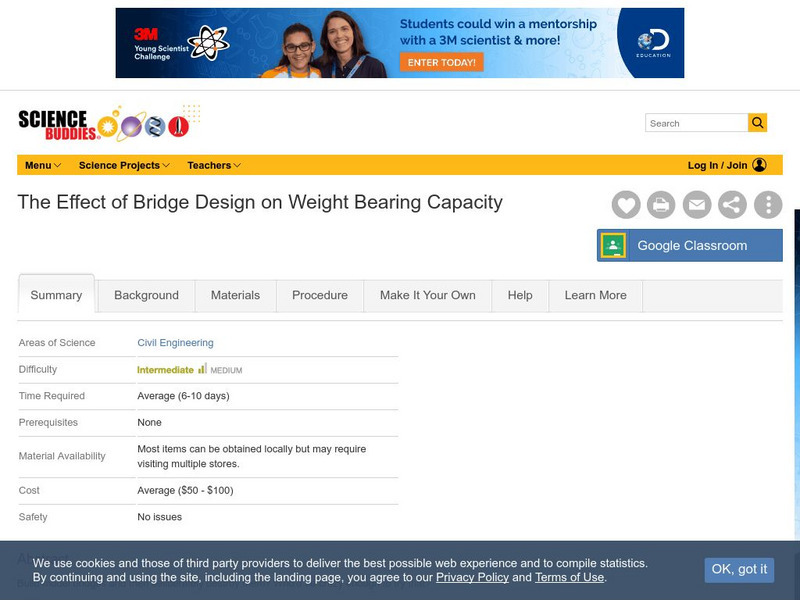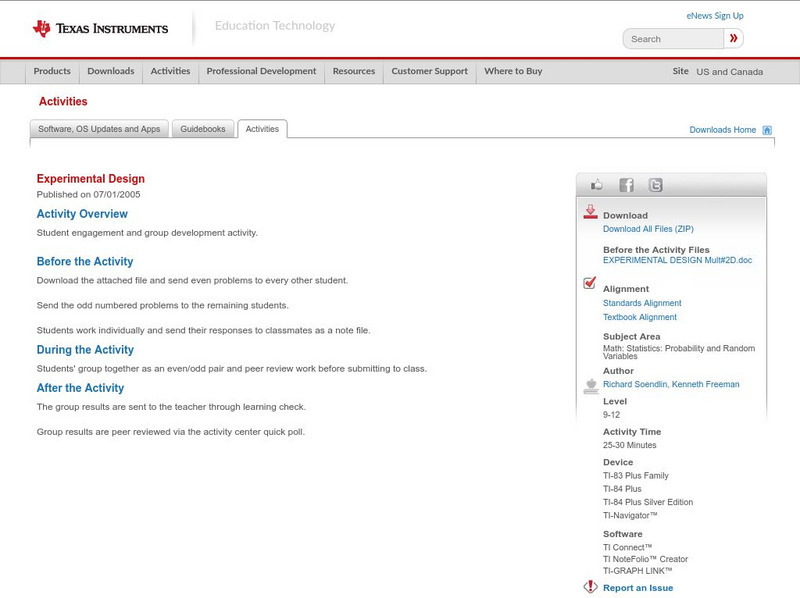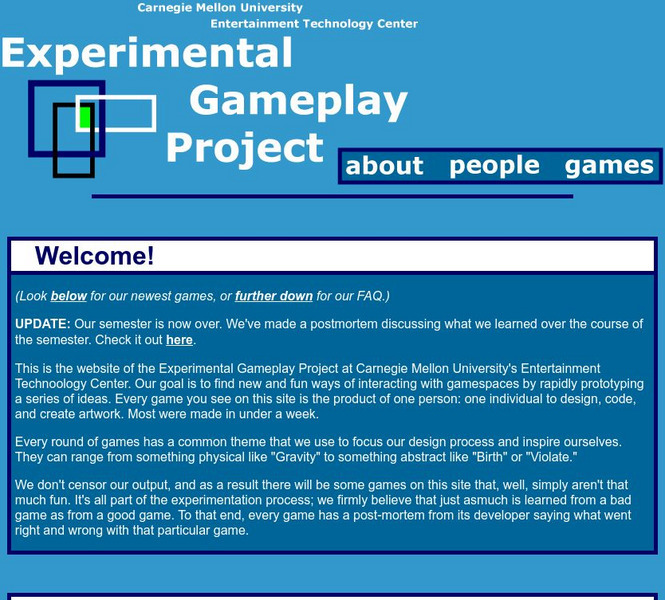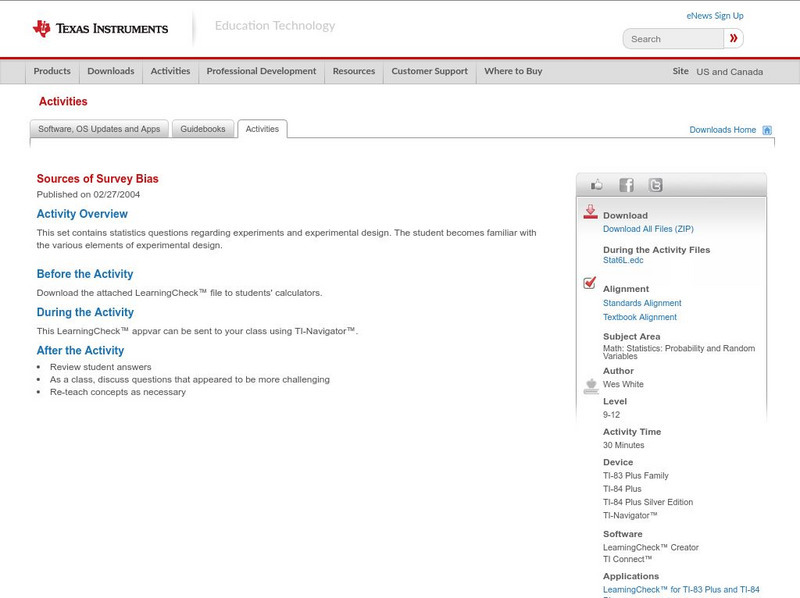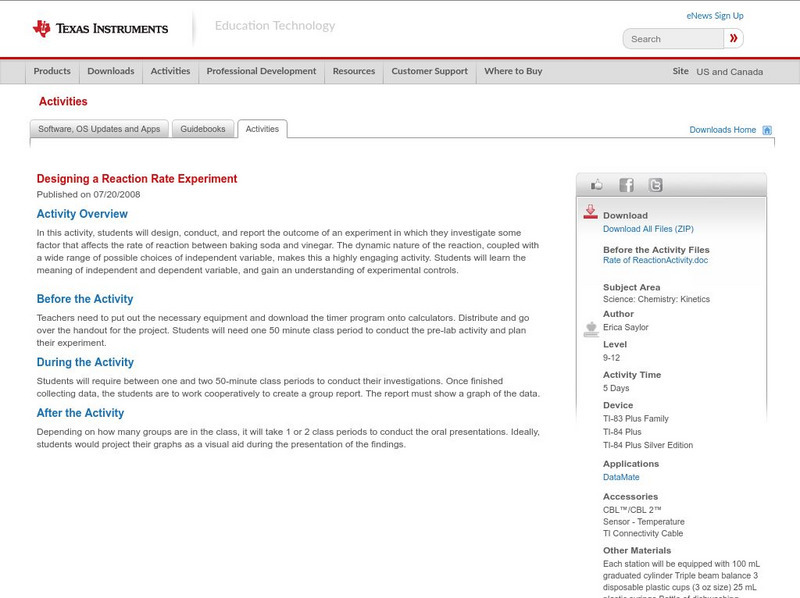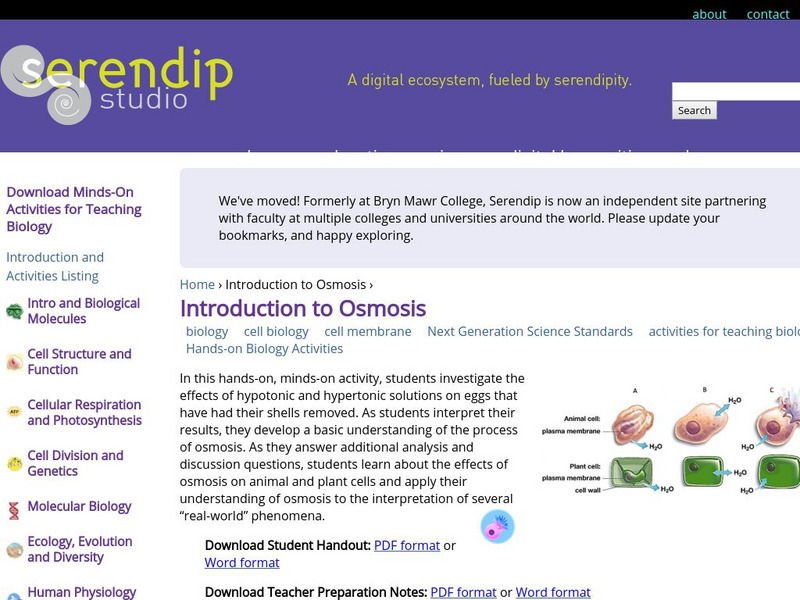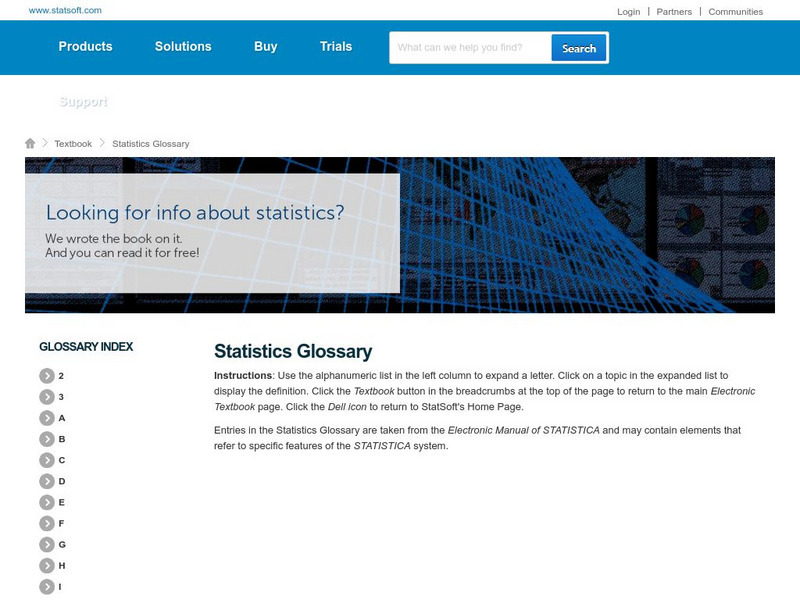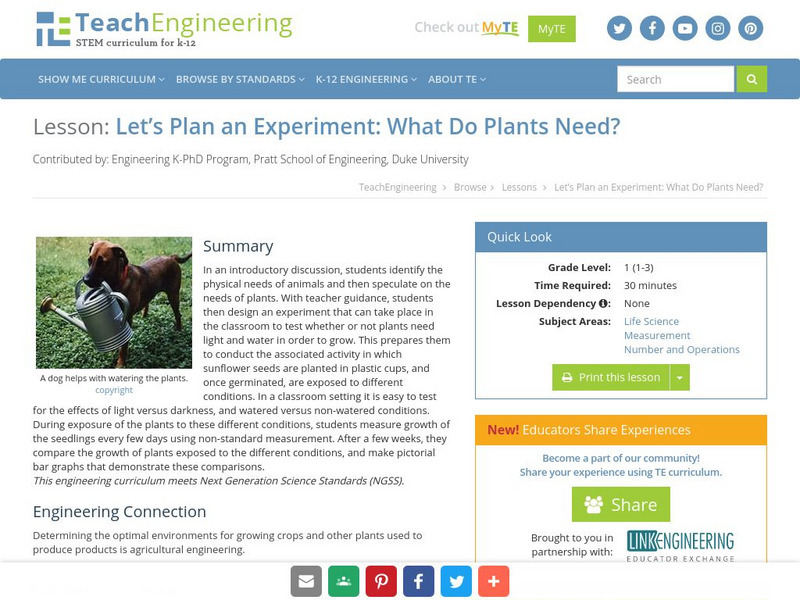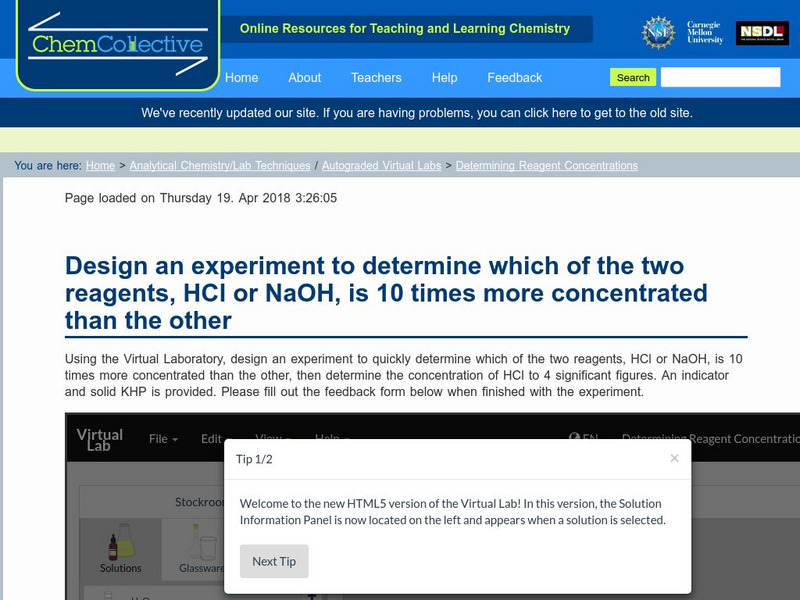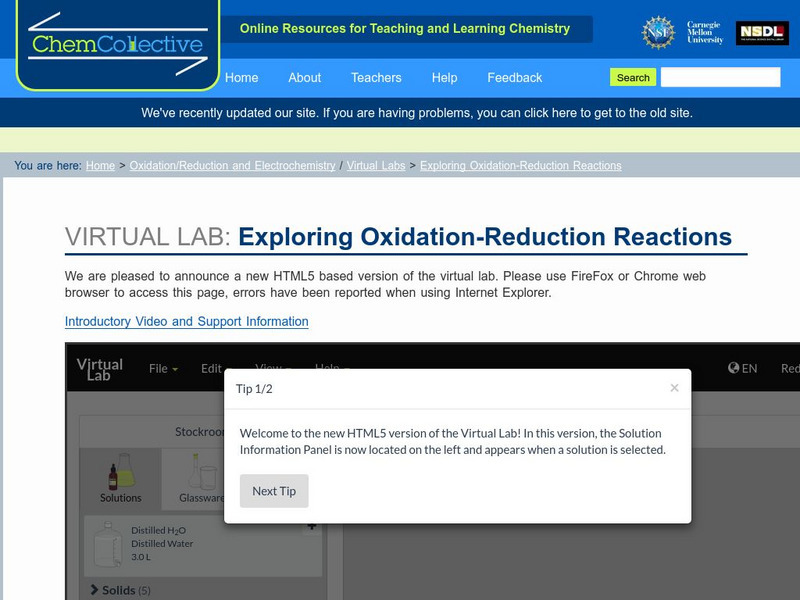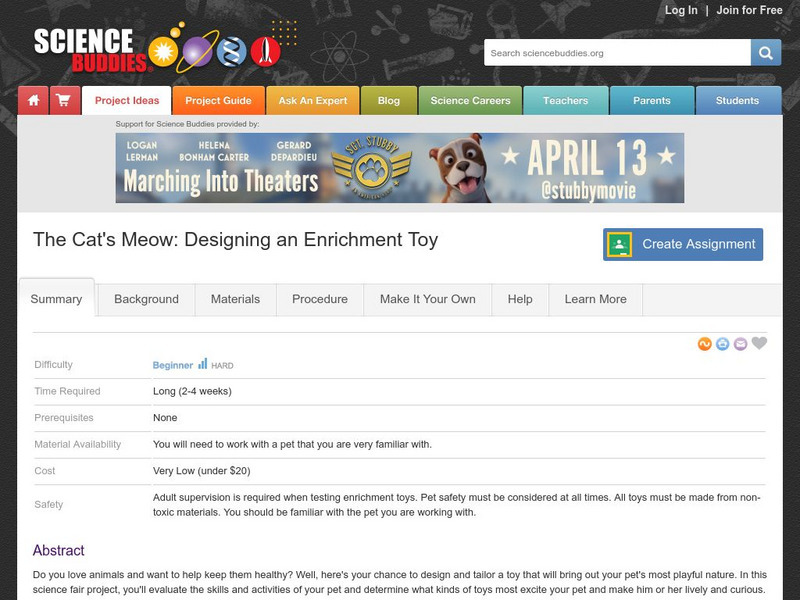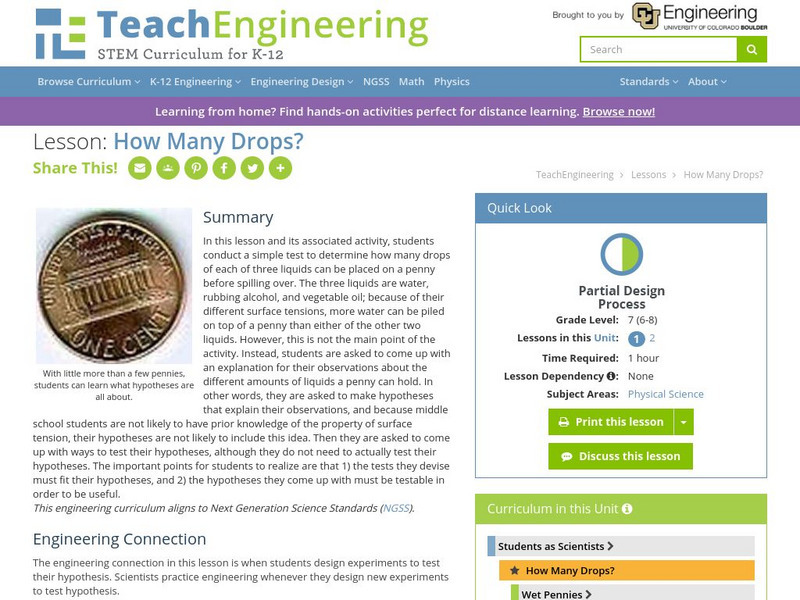Hi, what do you want to do?
Cornell University
Cornell University: Study Design Tutorial: Cross Sectional Studies
This tutorial from Cornell University's College of Veterinary Medicine explains what a cross-sectional study is, its key characteristics, how to assess events and outcomes, and some special considerations when choosing sample...
Science Education Resource Center at Carleton College
Serc: Mn Step: Worm Investigation to Explore Experimental Design
For this lesson, middle schoolers learn about how to design an experiment, factor in other potential effects, take observations, and record their findings. The experiment is done using worms in a lab setting.
Science Buddies
Science Buddies: Which Wing Design Creates the Greatest Lift?
Airplane wings do not all have the same design. With this Science Buddies project you can design your own wings to see which offers the greatest lift. The Science Buddies project ideas are set up consistently beginning with an abstract,...
Science Buddies
Science Buddies: Project Ideas: Design a Kite That Flies Best in Low Winds
In this science fair project, use a fan and an anemometer to test various kite designs to see which will fly best in low wind speed. The Science Buddies project ideas are set up consistently beginning with an abstract, objective, and...
Science Buddies
Science Buddies: The Effect of Bridge Design on Weight Bearing Capacity
This Science Buddies project asks that you identify different kinds of bridges, discover why they are built as they are, and then build three different bridges of your own out of balsa wood. See which one you think can bear the heaviest...
Texas Instruments
Texas Instruments: Experimental Design
Here's a list of multiple choice questions to use to review different sampling techniques and types of studies. While this is intended to be an activity that utilizes TI-Explorer by having students send their answers to each other, it...
Carnegie Mellon University
Experimental Gameplay Project
Experience the Experimental Gameplay Project at Carnegie Mellon University's Entertainment Technology Center.
TeachEngineering
Teach Engineering: Students as Scientists
This curricular unit contains two lessons that let students actually do the work of scientists as they design their own experiments to answer questions they generate. In the first lesson and its associated activity, students conduct a...
Science Buddies
Science Buddies: Project Ideas: Learn to Design an Ion Engine
The goal of this electricity and electronics science fair project is to understand how ions are used to propel spacecraft in space, and to use a NASA online simulator to design your own ion engine. The Science Buddies project ideas are...
Georgia Department of Education
Ga Virtual Learning: Epidemiology Study Designs
In this comprehensive interactive tutorial you will learn about clinical trials and how they are an example of epidemiological study designs. You will also be introduced to case control, ecological, cohort, and cross-sectional studies.
Texas Instruments
Texas Instruments: Sources of Survey Bias
This set contains statistics questions regarding experiments and experimental design. The student becomes familiar with the various elements of experimental design.
Science Education Resource Center at Carleton College
Serc: Water Bottle Rockets Understanding Energy
For this activity, students will design and construct a water bottle rocket. Students will demonstrate understanding of a good experimental design and analysis of results.
Science Education Resource Center at Carleton College
Serc: Plant Pest Control
The goal of this learning experience is to familiarize learners with the concept of scientific inquiry, hypothesis formation, experimental design, data analysis, and interpretation. Students will explore the website "Which Pest Control...
Texas Instruments
Texas Instruments: Designing a Reaction Rate Experiment
In this activity, students will design, conduct, and report the outcome of an experiment in which they investigate some factor that affects the rate of reaction between baking soda and vinegar. The dynamic nature of the reaction, coupled...
Bryn Mawr College
Serendip: Investigating Osmosis
Brief text summary of what students learn in the Investigating Osmosis lab along with links to download Student Handouts and Teacher Preparation Notes in PDF or Word formats. Students design and run an experiment to demonstrate osmosis...
Science Buddies
Science Buddies: Efficient Propeller Design
There's a lot to understand about the simple propeller to see how it affects lift and thrust in an airplane or helicopter. This Science Buddies project gives you lots of ideas on how to change the design of the propeller to achieve...
Other
Stat Soft: Statistics Glossary
Dozens of statistical terms are defined and illustrated in this glossary.
TeachEngineering
Teach Engineering: Does Your Chewing Gum Lose Its Flavor?
In the first part of the activity, each student chews a piece of gum until it loses its flavor, and then leaves the gum to dry for several days before weighing it to determine the amount of mass lost. This mass corresponds to the amount...
TeachEngineering
Teach Engineering: Who Needs What?
The teacher leads a discussion in which students identify the physical needs of animals, and then speculate on the needs of plants. With guidance from the teacher, the students then help design an experiment that can take place in the...
Chemistry Collective
Chem Collective: Determining Reagent Concentrations
Using the Virtual Laboratory, design an experiment to quickly determine which of the two reagents, HCl or NaOH, is 10 times more concentrated than the other.
Chemistry Collective
Chem Collective: Exploring Oxidation Reduction Reactions
Design an experiment to order Cu, Mg, Zn and Pb from strongest to weakest reducing agent.
Science Buddies
Science Buddies: The Cat's Meow: Designing an Enrichment Toy
A great Science Fair project that involves analyzing your cat's behavior and designing toys that will be stimulating both physically and mentally. The Science Buddies project ideas are set up consistently beginning with an abstract,...
Science Struck
Science Struck: What Is Experimenter Bias and How to Avoid It?
When doing research, it is important to be aware of one's biases and how to prevent them impacting on the design of an experiment or analysis of a research topic. Learn some techniques used to avoid bias in an experiment.
TeachEngineering
Teach Engineering: How Many Drops?
In this lesson and its associated activity, students conduct a simple test to determine how many drops of each of three liquids can be placed on a penny before spilling over. The three liquids are water, rubbing alcohol, and vegetable...
Other popular searches
- Experimental Design Diagram
- Experimental Design Labs
- Science Experimental Design
- Biology Experimental Design
- Experimental Design. Plants
- Experimental Design Anatomy
- Experimental Design Physics
- Health Experimental Design
- Experimental Design Problems
- Disease Experimental Design
- Experimental Design Plants






